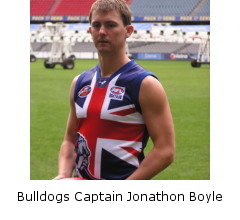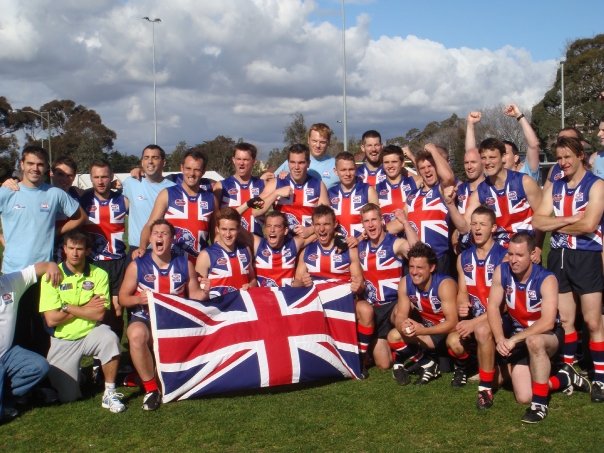An International Year for British Footy
- Tuesday, December 09 2008 @ 10:05 pm ACDT
- Contributed by: Adam Bennett - AFL England President
- Views: 4,010


Now the wind and rain have settled back into the British Isles, there is a chance to look back at a manically busy year of footy in Great Britain. Alongside a steadily developing raft of domestic competitions, 2008 saw huge growth in international footy being played and planned for the near future, with adult and junior fixtures being played in Britain, mainland Europe and Australia.
Probably foremost in many minds was the International Cup (IC), the tri-annual event attended by footy playing nations from across the globe and a chance for the best of the Brits to test themselves against their peers from 4 continents.
Focused preparation had been underway for over a year, giving the coaching staff opportunities to see many more players in action and decide where they could fit into the game plan.
A benefit of this was the chance to look outside the traditional recruiting grounds of the London-based competitions, with 12 players selected from clubs across regional England and the fledgling Welsh league – a real endorsement of the development of British players outside the Aussie-laden and more experienced clubs in London.
The Bulldogs management and players will the first the first to admit that positionally the squad did not achieve what was expected or aimed for, finishing 9th out of the 16 competing teams. After a solid opening against the Peace Team, probably the only disappointing performance came against a rampaging Nauru outfit, rejoining the tournament after missing the 2005 event. The impact of having over half the squad playing in regional Australian leagues for months prior to the IC clearly paid dividends for the Islanders.
The lads followed this deflating experience with a totally different battle against eventual champions Papua New Guinea, the Brit heads high even in defeat after raising their game to much closer to the required level to compete internationally. Following this with victories over European power Denmark and the Samoans – the banes of the GB team in 2005 – meant that the team finished with more wins than defeats – the first GB team to do so in the IC. A mentally and physically draining 2 weeks could then be reflected on and learned from.
At the same time their senior colleagues were battling against odds in the IC, a junior Bulldogs squad of 22 players and 8 support staff had also made the immense journey to warmer shores to test themselves against 3 local college teams in Melbourne and Geelong. Several school teams in and around London have benefited from contact with established clubs and the junior game is growing steadily.
Acquitting themselves very well against their Aussie counterparts showed that the effort and commitment to get this going had not been wasted and this success bodes well for the senior Bulldogs in the future, if this development can be maintained and built upon in the coming years.
When the dust settled from the IC, it was the turn of another group of domestic warriors to head overseas to defend national pride against the cream of the developing European competitions, as the annual EU Cup kicked off in Prague.
The England Dragonslayers were formed in 2005 for the original EU Cup held in London and have largely remained separate from the GB Bulldogs, with limited crossover in playing personnel and this competition was no different, with virtually all the squad picked from the clubs making up the English Southern League. The reduced numbers game has really paid dividends in making the sport that much more available across the wider British Isles and this has supported the creation and expansion of leagues outside London over the last few years.
The Dragonslayers met up with 11 other nations in Prague in the Czech Republic and through several rounds of competition, battled their way to a first EU Cup victory.
It was a great success for the Dragonslayers, after reaching the final of the annual Brit Cup – the one weekend each Summer where the Aussies from British clubs can hang their boots up, grab a tinnie and watch their local team-mates compete in 12-a-side competition for the title of Brit Cup Champions. Although competing under the banner of the Southern League, the team contained many of the Dragonslayers regulars and they did themselves proud against their usually more experienced opponents, losing only to the all-conquering West London Wildcats in the final.
Coach Rob Fielder, a veteran of the regional British game, said “We would like to play more international matches and perhaps a double or triple header next year with Wales. We will structure it into the season next year. It will be great to get a database of all the English players available from all clubs, then we can ensure no-one is unaware of internationals and potentially missing out. Although it will take a whole load of hard work, the future is exciting.”
Joining the English in the Brit Cup were the Welsh national team as well, drawn from the 3 clubs making up their young domestic competition. Enjoying moderate success on the day and demonstrating the rapid development of local talent with 2 players selected in the Bulldogs' IC campaign, the Welsh would go one better in the Dragon Cup – probably the last footy action of the domestic calendar in 2008.
This event is an annual 2-match head-to-head between the English and Welsh and will be a great platform for assessing the development of players from across both countries – as well as giving an ideal opportunity for the age-old rivalry between the neighbouring countries to continue!
After a solid victory in Cardiff last year, still on a high from the EU Cup win and bolstered by several Bulldogs, the Dragonslayers went into the series with high hopes, but across the 8 quarters could not contain the passionate and committed play from the Welsh Dragons. The dominant area for the Welsh was the centre of the pitch, with a very strong, hard-tackling contingent giving them a solid platform to set up regular attacks, eventually hoisting the Dragon Cup with an aggregate victory of 80 points.
Watching the games, GB Coach Charlie Kielty said “…it was fantastic for me to see so many potential GB players on the ground at one time. I was very impressed with the way the standard of the Welsh has improved over the last 12 months and I have walked away with a list of players that will be invited to GB training and have a chance of working their way into the squad.”
So now - a chance to catch our breaths, rest some tired and bruised bodies and prepare for a 2009 that promises to be just as busy and exciting. After the International Forum in Melbourne at the start of the IC, Denmark, Ireland and Great Britain are planning matches against each other, with the Irish also discussing a more local ‘Celtic Cup’ with the Welsh and Scottish.
With a full-format European Cup also proposed and still being considered, there will be plenty of action going on top of club commitments and for many, the opportunity to represent their nation now may not just be a childhood dream, but an achievable reality. The increased activity can only be a good thing for the development of the sport across Europe.
Editor: We welcome Adam Bennett on board as our UK writer. Adam has been a key member on and off the field of the Reading Roos in England and is a British Bulldogs representative, including at the recent International Cup.

The British Bulldogs after an IC08 win


 RSS news
RSS news Twitter
Twitter Facebook
Facebook